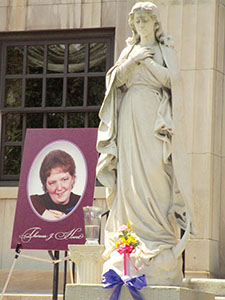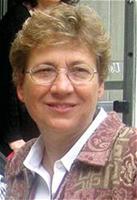By BETSY TAYLOR
On July 24, Richard Plotts, a psychiatric patient, pulled a gun during his afternoon appointment at a wellness center on the Mercy Fitzgerald Hospital campus in Darby, Pa. He shot and killed his caseworker, Theresa Hunt, 53, and wounded his psychiatrist, Dr. Lee Silverman. Silverman returned fire with his own gun, hitting Plotts who was then subdued by a doctor and another caseworker in a hallway. Both Silverman and Plotts survived. Silverman has returned to work and Plotts is being held without bail on multiple charges including murder.

Colleagues wore purple ribbons to an outdoor memorial service for Theresa Hunt. Purple, which represents anti-violence, was Hunt's favorite color.
In a few chaotic minutes, the expectation of safety that patients and staff share was punctured. Sr. Donna Watto, RSM, the hospital's vice president of mission integration, held on to her composure, drawing on her skills in leadership and communications to help initiate the hospital's crisis response plan and on her faith to comfort patients and staff in their shock and grief. Sr. Watto has worked at Mercy Fitzgerald for 11 years of her 30-year career in the Mercy Health System. In an interview conducted by email in early September, she recounted the tragic events of that summer day and her efforts to provide immediate comfort, and she described the hospital's continuing work of spiritual and emotional healing.
When did you first learn of the shootings and how did you respond?
I was just returning from a meeting around 2:20 p.m. when a colleague approached me in my office about something that was happening in the wellness center. My office is located in the administration wing of the hospital, directly across the street from the wellness center. I ran to the window and saw police cars pulling up. I then ran upstairs to the bridge that connects the hospital to the wellness center, but couldn't get through because the wellness center was already on lockdown. From the bridge, I spotted our chief paramedic on the street and went to him for additional details. I called the administration office from my cell phone to relay the information and instructed that calls be made to all the appropriate leaders to activate our response and to ask all nurse managers to visit each patient in the hospital to assure them the situation was contained, and they were safe. When the police began escorting our colleagues and patients out of the wellness center, I was able to join them as the police brought everyone to another part of our campus, the auditorium in our medical science building. I stayed with our colleagues and patients in that auditorium until the lockdown was cleared later that evening. I spoke to so many patients and colleagues that day in the auditorium. I felt like all I and the senior team did that Thursday was give hugs and console those who were afraid and in disbelief of what just happened.
What did you draw from in the first few hours?
I felt that many of my actions that day were a result of my collective experience from all the roles I've had at Mercy and as a Sister of Mercy. I certainly drew on my experience as a communications leader, knowing who had to be notified, etc. I drew on my experience as a mission leader and offered support to those I encountered. I didn't really stop to think about it; it was an innate reaction. My long history here has given me the wonderful advantage of knowing and being known to so many colleagues. I know they look to me for spiritual leadership and that day they looked to me to comfort them and be the safe haven that had been snatched from them in this horrible tragedy.
How is the hospital leadership honoring Theresa Hunt and showing compassion for her family?
We certainly ensured that on the day of the shooting, Theresa was treated with the utmost care, respect and dignity. Out of respect for the family and to maintain the sacredness of that moment, I would rather not discuss those details.

Sr. Watto
Once the situation was contained, we immediately reached out to Theresa's next of kin, her brother, and arranged to meet with him. We were in contact with him a number of times throughout the incident and funeral and that contact has continued.
We held a private memorial service for Theresa at the hospital on August 20, where our colleagues had the opportunity to honor her life. And on Mercy Day, Sept. 24, (2014), we will do a blessing and dedication of a tree and bench that we have placed in front of the wellness center in her honor. We invited her brother to the memorial service and will invite him to the upcoming blessing.
Is there something about the Catholicity of the institution that made the response to this tragedy different than it might have been elsewhere?
We openly called on God to be a loving support throughout this incident. We definitely drew on our faith on the day of the incident, as well as at the memorial service, and will incorporate our faith during the blessing of the tree and bench. I have been sharing daily reflections with our staff via email for years, and on the days and weeks following the tragedy, I specifically sought out reflections that were relevant with our grieving process.
How has Mercy Fitzgerald Hospital supported Dr. Lee Silverman in his recovery?
Many members of senior leadership have reached out to Dr. Silverman from day one. I went to his office the day he returned to work.
The night of the tragedy, I sent an email to all of our colleagues, asking for prayers for those involved, including the victims and patient.
What did the hospital do in the early weeks after the incident that has been particularly healing for the hospital community?
Our colleagues have been supported by myself and all senior leadership team members since the first day. We have been told by colleagues how much that presence and outreach has meant to them.
Representatives from our employee assistance program — Carebridge counseling services — arrived on-site the day of the tragedy. We offered these services to all colleagues, physicians, patients and visitors. Carebridge was on-site for at least two weeks and continues to be accessible.
One of the positive things that came out of this tragedy was the way that our hospital community came together, stronger than ever. We continue to support each other through this healing process and remain focused on the safety and care of our patients and each other.
Has the shooting death of Theresa Hunt changed the way staff interact with psychiatric patients?
In spite of their incredible loss and grief, our behavioral health colleagues never once wavered in the face of duty. We admire the example they have set for us and are grateful for the courageous and meaningful work they do for our community.
Have you learned anything that might be helpful for other hospitals to think about or prepare for in the wake of what occurred?
I've learned more than ever the importance of having a plan in place for the initial response and then to support our colleagues and patients, and how such a plan, in the wake of an incident like this, will need to be continually analyzed and revamped.
How do you care for others during this, while also ensuring that you are able to process what happened and take care of yourself physically, emotionally and spiritually?
I've devoted some quiet time for reflection and prayer to help me try and understand and deal with what has happened. I have learned that it is a process and that for all of us this will take time. Most of all, I've relied on the strength of our colleagues from whom I continually learn. Walking with them has been a privilege that I cherish as part of my ministry.
Copyright © 2014 by the Catholic Health Association
of the United States
For reprint permission, contact Betty Crosby
or call (314) 253-3477.